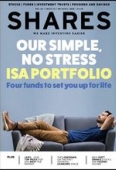Archived article
Please note that tax, investment, pension and ISA rules can change and the information and any views contained in this article may now be inaccurate.
Trusts regularly raising cash to invest in assets can hamper returns

On the face of it, investment trusts and other vehicles which invest in long-term assets with long-term cash flows should be a sound investment, especially if there is an element of growth either in asset values or dividends.
For example, renewable energy infrastructure projects – which are set to grow exponentially as companies and governments around the world target zero carbon emissions by 2050 – ought to be a reliable source of returns for investors.
GCP Infrastructure (GCP), a £900 million investment vehicle run by Gravis Capital, invests in wind and solar assets (41% of the portfolio in the year to last September) along with hydro power, anaerobic digestion and biomass energy (roughly another 20%). The balance of the portfolio is invested in supported living and private finance initiative projects.
The fund buys loans issued by companies raising money to build projects, and as of last September the average yield on the portfolio was 8.1% while the average life of the loans was 15 years.
TOO GOOD TO BE TRUE
This sounds like a great business, getting an 8% yield in a world where bank base rates are close to zero and trillions of dollars of debt trade at negative interest rates.
Yet shareholders in GCP Infrastructure probably don’t feel much like celebrating. Since 2015 the share price has gone from 120p to 102p while the company has raised close to £450m in new shares resulting in massive dilution of earnings. Remember every time new shares are issued the value of the existing shares is diminished.
Fortunately, net asset value per share is slightly higher than in 2015 but that’s not much comfort for investors.
On a total return basis the shares may have beaten the All-Share but last year’s dividend was barely covered. There are plenty of slides with the full year results explaining the portfolio challenges and risks, but the bottom line is, even with the dividend stream, the shares haven’t been a great investment.
Investors should probably also weigh up the potential impact of rising gilt yields. As the ‘risk-free’ interest rate rises, so does the rate at which future cash flows are discounted, which makes long-duration assets like infrastructure loans less attractive.
A LOOMING TIPPING POINT
Analysts at Stifel believe the tipping point for the infrastructure sector would a 10-year gilt yield of more than 2.5%, which seems a long way off when yields are currently below 1%, but the market has a habit of worrying about these things.
NextEnergy Solar (NESF) invests in solar photovoltaic assets. According to its website, every hour the world receives enough energy from the sun to power the entire planet for a year, so what’s not to like?
Well, the share price for a start. Since 2015 the shares have declined in value, while the firm has raised £480 million in new capital – £200 million of which was in non-voting preference shares, which technically count as debt – and paid all its dividends in stock so there hasn’t even been an ‘income stream’ as such, although investors can sell scrip shares once they have been admitted to the market.
On the bright side, shareholders can bask in the success of its energy sales desk, and after the build-out this year of solar farms in Hampshire and Lincolnshire using £45 million of their money they can look forward to the firm hitting its target of 150 mega watt peak subsidy-free by 2022.
House broker Shore Capital salutes the firm’s ‘ability to develop attractive value-accretive opportunities in the UK subsidy-free space’ and says it offers investors ‘a highly attractive dividend yield and exciting growth prospects’.
SOUNDING A BUM NOTE
Another great business, on paper at least, is music royalties. Even with no live performances last year, cash flows from publishing rights grew thanks to the global uptake of music streaming and the use of hit records in films and commercials. Buying up song rights and getting paid every time they are played seems like a no-brainer.
Broker Liberum sees ‘considerable upside for revenue growth over the long term’ through new platforms like Peloton and Tik Tok, while rising acquisition prices are good for asset values but could crimp future returns.
In theory, therefore, shareholders in Hipgnosis (SONG) should have made an absolute mint. Except they haven’t. Since they listed in 2018, shares in the fund have gained just over 20%, which is better than the All-Share but hardly commensurate with the growth story or the firm’s voracious appetite for content.
Since it floated, by our calculations Hipgnosis has raised £734 million in new shares and ramped up its banking facilities from £150 million to $600 million. It has also bought up dozens of catalogues, lifting net asset value per share from 98.7p in 2018 to 116.7p last year.
Essentially, as long as shareholders and its banks are happy to stump up the money the firm can keep on hoovering up music rights ad infinitum. This may help sustain a growing dividend but holders need to be mindful of the accompanying dilution this would imply.
Important information:
These articles are provided by Shares magazine which is published by AJ Bell Media, a part of AJ Bell. Shares is not written by AJ Bell.
Shares is provided for your general information and use and is not a personal recommendation to invest. It is not intended to be relied upon by you in making or not making any investment decisions. The investments referred to in these articles will not be suitable for all investors. If in doubt please seek appropriate independent financial advice.
Investors acting on the information in these articles do so at their own risk and AJ Bell Media and its staff do not accept liability for losses suffered by investors as a result of their investment decisions.

 magazine
magazine








